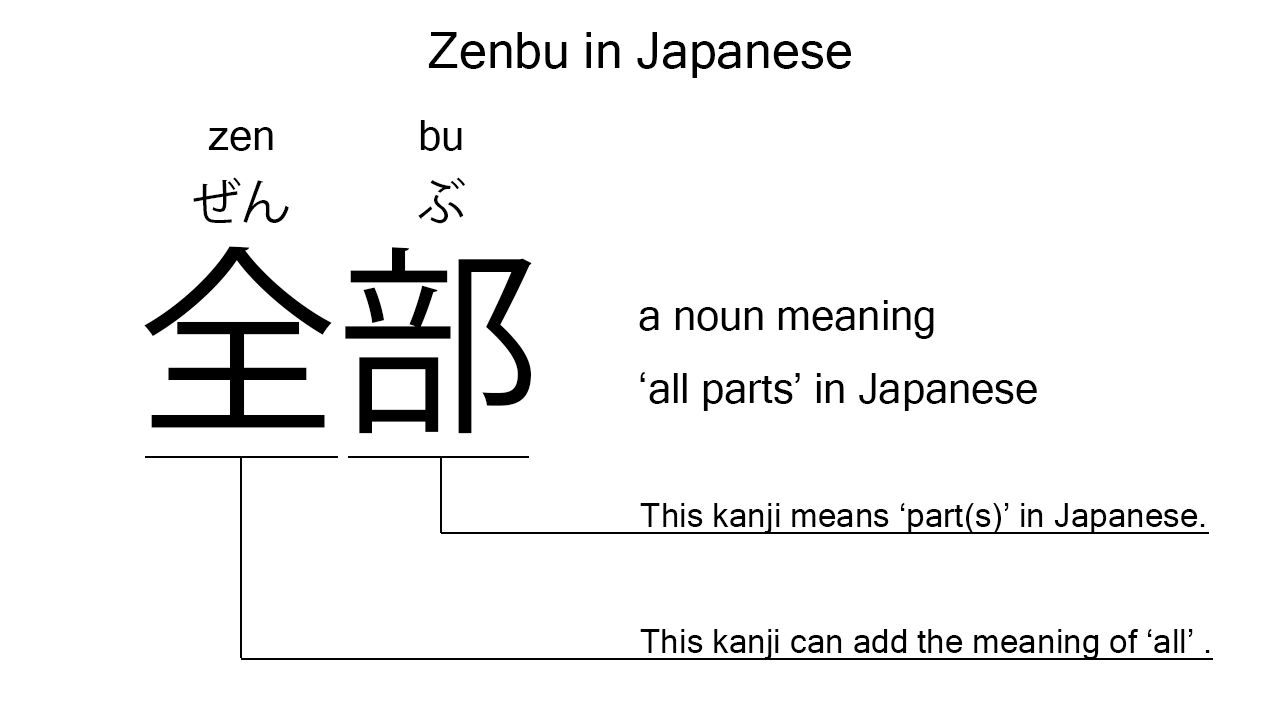What does “zenbu” mean in Japanese?
Native speakers say “zenbu” often to mean ‘all parts’ in Japanese. Perhaps, some Japanese learners know this word as it is sometimes used in Japanese conversations. In this blog post, however, I will explain this word in detail based on its kanji expression. And also, I will explain how to use it through example sentences. My explanations would help Japanese learners understand “zenbu” more clearly. Then, let’s get started!
Contents
Definition and meanings of “zenbu”
Let me start with the definition and meanings of “zenbu”.
- zenbu – 全部 (ぜんぶ) : a noun meaning ‘all parts’, ‘whole’, or just ‘all’ in Japanese.
Japanese native speakers use this noun to refer to the all parts of something. So, its usage is similar to those of the English words, “whole” and “all”.
The definition and meanings are simple and clear. To understand this noun more clearly, however, let me explain its kanji characters in detail, one by one.
What does “zenbu” literally mean in Japanese?
The kanji expression of “zenbu” consists of the following two kanji characters:
- 全 : a kanji character widely used to mean ‘all’ in Japanese. This can also work as a prefix to add the meaning of ‘all’.
- 部 : a kanji character used to mean ‘part’ in Japanese. This can also be found in other words like “heya“.
These two kanji characters tell us that “zenbu” literally means ‘all parts’ in Japanese. This literal interpretation is completely in line with the actual meanings.

When we meet new kanji expressions, we should check their kanji characters in detail to understand their meanings clearly and deeply. In many cases, kanji characters tell us a lot about the meanings of the expressions they form. Actually, here, we could get the better understanding of “zenbu” through the detailed kanji check above.
So far, I’ve explained the definition and meanings of “zenbu” together with its kanji characters. Then, let me explain how to use it through the example sentences below.
Example #1: how to say “whole” in Japanese
tsuki no zenbu wo miru koto wa deki nai – 月の全部を見ることはできない (つきのぜんぶをみることはできない)
We cannot see the whole of the moon.
Below are the new words used in the example sentence.
- tsuki – 月 (つき) : a noun meaning ‘the moon’ in Japanese.
- no – の : a case particle joining two nouns. Normally, the first one can work as a modifier to describe the second. In the example, this works to join “tsuki” and “zenbu”. The formed phrase literally means ‘the whole of the moon’ in Japanese. Word orders in Japanese and English are different, but the role of this case particle is similar to that of “of”.
- wo – を : a case particle used to make the object word in a sentence. In the example, this is used after “tsuki no zenbu” to make the object in the noun clause.
- miru – 見る (みる) : a verb meaning ‘to see’ in Japanese.
- koto – こと : a noun working as a noun clause marker. In the example, this works after “tsuki no zenbu wo miru” to make the noun clause in the sentence.
- wa – は : a binding particle working as a case marker or topic marker. In the example, this works after the noun clause to make the object in the sentence.
- deki – でき : one conjugation of the verb, “dekiru”, which means ‘to be able to do’ or ‘can do’ in Japanese. In the example, it has been conjugated for the better connection with its following word.
- nai – ない : an auxiliary verb used after a verb, adjective, or auxiliary verb to deny its meaning. In the example, this is used after “deki” to deny its meaning.
This is a typical usage of “zenbu”. In this example, it works as a part of the noun phrase, “tsuki no zenbu”, which means ‘the whole of the moon’ in Japanese.
Example #2: another usage of “zenbu”
anata no zenbu ga suki desu – あなたの全部が好きです (あなたのぜんぶがすきです)
I love all of you.
Below are the new words used in the example sentence.
- anata – あなた : a pronoun meaning ‘you’ in Japanese.
- ga – が : a case particle used to make the subject word or the object word in a sentence. In the example, this is used after “anata no zenbu” to make the object in the sentence.
- suki – 好き (すき) : the stem part of the na-adjective, “sukina”, which means ‘favorite’ in Japanese. Native speakers, however, often use this as an individual word to mean ‘to like’ or ‘to love’ in Japanese. In the example, this is used to mean ‘to love’.
- desu – です : an auxiliary verb used after a noun or adjective to make it polite. Probably, this is well known as a part of Japanese desu form. In the example, this is used after “suki” to make it sound polite.
This is another typical usage of “zenbu”. In this example, it works as a part of the noun phrase, “anata no zenbu”, to mean ‘all of you’ in Japanese. When we want to refer to the all parts of something in Japanese, anyway, this noun is always a very good option.
Summary
In this blog post, I’ve explained the definition and meanings of “zenbu” in detail based on its kanji expression. And also, I’ve explained how to use it through the example sentences. Let me summarize them as follows.
- zenbu – 全部 (ぜんぶ) : a noun meaning ‘all parts’, ‘whole’, or just ‘all’ in Japanese. These two kanji characters mean ‘all’ and ‘part’ respectively, so this noun literally means ‘all parts’ in Japanese. When we want to refer to the all parts of something in Japanese, this noun is always a very good option.
Hope my explanations are understandable and helpful for Japanese learners.